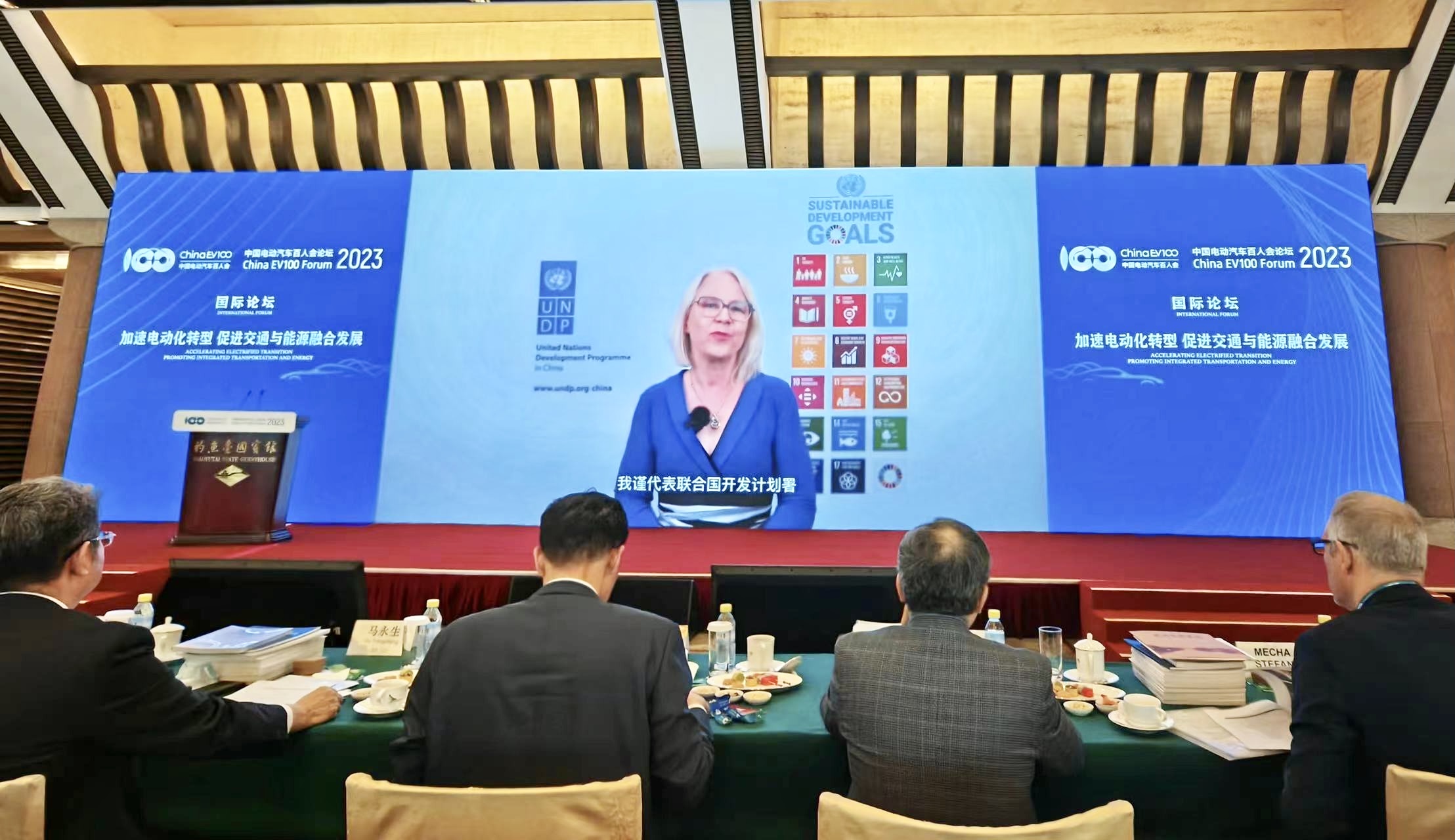Remarks by Ms Beate Trankmann at China EV100 2023 Forum
April 4, 2023

UNDP Resident Representative in China Beate Trankmann delivers opening remarks via video at the EV100 2023 Forum
Distinguished Director-General Chen Qingtai,
Chairman Li Yizhong,
Academician Chen Qingquan,
Good morning, ladies and gentlemen,
On behalf of the United Nations Development Programme (UNDP), I’m delighted to join you at the China EV100 Forum 2023!
This event comes at a critical time. The world faces many urgent challenges that have put the Sustainable Development Goals (SDGs) – to protect people and planet by 2030 – in serious jeopardy.
None is more urgent than the climate crisis, which has seen CO2 emissions rise to their highest levels in history, putting the world on course to exceed the 1.5-degree warming target set by the Paris Agreement by more than double.[1] The consequences are devastating, from extreme and destructive weather events, to collapsing ecosystems and rapidly diminishing biodiversity.
The report released last month by the Intergovernmental Panel on Climate Change (IPCC) indicates that “every increment of warming results in rapidly escalating hazards”[2].
We must act now to chart a new course for the future – one that can ensure the survival and wellbeing of our children and grandchildren. And the transport sector will be critical in this.
In China, transport contributes to around 10 percent of total CO2 emissions,[3] that’s over 1 bln tonnes of CO2. Accelerating clean mobility is therefore not only vital to China’s Dual Carbon Goals, but also to the achievement of the 2030 Agenda for Sustainable Development globally.
To date, investment in new energy vehicles (NEVs) in China has grown exponentially. As of the end of 2022, the total number of NEVs has reached 13.1 million. NEVs account for roughly 23% of newly registered vehicles in 2022. As important as this achievement is, NEVs only account for about 4% of China’s total vehicles. If we are to succeed in fully decarbonizing our transportation, in a way that is just and inclusive, we must take further transformative actions in three key areas:
First, we need accelerated deployment driven by innovation.
Leveraging technological and scientific advancements, it is critical to accelerate the electrification of the transport sector with renewables, improve efficiency, and make new fuel options such as hydrogen and ammonia more available. In addition, innovation in digital technology, and a circular economy, will be important gamechangers. Achieving zero-carbon transport will require fully harnessing all these solutions, while making them economically viable, environmentally sustainable, and socially inclusive.
Second, we need an enabling and inclusive policy environment.
The climate agenda must be the driving force for how the transport sector is designed in the future. To this end, in China, the Dual Carbon Goals should be underpinned by policies, regulations, and pricing mechanisms for new energy vehicles. This will help incentivize climate-responsible investment decisions and consumer choices while ensuring that everyone can benefit from low carbon transport.
Beyond that, our education systems, both academic and vocational, must also be prepared to nurture talents with new skills and knowledge. For the NEV industry, this would include a combination of automotive technology, climate sciences, businesses and entrepreneurship, as well as socio-economic analysis. It is also critical that employers ensure that career pathways are open to both men and women equally, as well as vulnerable groups.
Finally, we need international cooperation.
The automotive industry is highly globalized and as such, fully decarbonizing our modes of transportation will require global collaboration. This includes knowledge sharing, enhanced cooperation on standards, trade, and supply chains, and equitable access to components and raw materials. Only by working together, can countries generate the rapid growth necessary in renewables and increase NEV deployment globally.
As many of our friends at today’s event know, UNDP has been supporting cities and regions in China to pilot hydrogen fuel cell vehicles (FCVs) since 2003. Together with our partners, we have gone from helping to import China’s first three FCVs ever, to now having deployed thousands of domestically manufactured vehicles across 8 cities, accounting for around a quarter of all FCVs in China. These experiences and lessons learned have also helped inform FCV development in 10 other developing countries.
Moving forward, I want to reaffirm our commitment and readiness to continue cooperating with both national and local governments on expanding the deployment of new energy vehicles, as well as further boosting the development of green hydrogen. The latter is vital to the production of FCVs that can most effectively reduce emissions and mitigate climate change on a broad scale.
In addition, we aim to continue facilitating international cooperation, pilot policy innovations, strengthen supply chains, and support a just transition by preparing people for the future of work in a green economy.
To this end, we look forward to continue working together with the EV100 to share best practices on new energy vehicles globally, through our network across 170 countries and territories around the world.
Climate change will affect everyone, everywhere, and is therefore all of our responsibility. A green and sustainable future is still within our grasp, but time is running out, and we must act now.
As the Chinese saying goes,“百花齐放才是春”(It takes more than a hundred flowers to make a spring). Together, I am confident that we can turn the vision of a zero-carbon transport sector into reality.
The survival of the planet, our lives, and those of generations to come, depend on it!
Thank you.

 Locations
Locations


